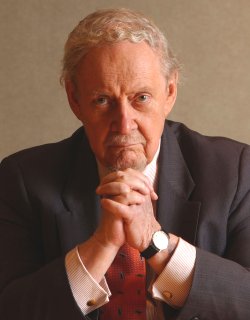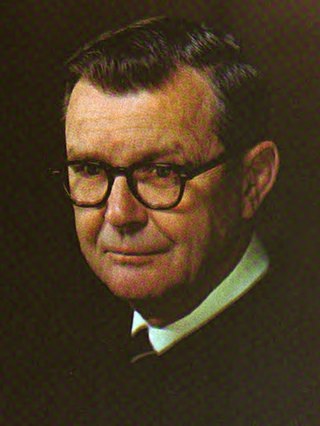
The Supreme Court of the United States (SCOTUS) is the highest court in the federal judiciary of the United States. It has ultimate appellate jurisdiction over all federal court cases, and over state court cases that involve a point of U.S. Constitutional or federal law. It also has original jurisdiction over a narrow range of cases, specifically "all Cases affecting Ambassadors, other public Ministers and Consuls, and those in which a State shall be Party." The court holds the power of judicial review, the ability to invalidate a statute for violating a provision of the Constitution. It is also able to strike down presidential directives for violating either the Constitution or statutory law. However, it may act only within the context of a case in an area of law over which it has jurisdiction. The court may decide cases having political overtones, but has ruled that it does not have power to decide non-justiciable political questions.

Robert Heron Bork was an American legal scholar who served as solicitor general of the United States from 1973 until 1977. A professor by training, he was later acting United States Attorney General and a judge on the U.S. Court of Appeals for the D.C. Circuit from 1982 to 1988. In 1987, President Ronald Reagan nominated Bork to the U.S. Supreme Court, but the Senate rejected his nomination after a contentious and highly publicized confirmation hearing.
Lawrence v. Texas, 539 U.S. 558 (2003), is a landmark decision of the U.S. Supreme Court in which the Court ruled that most sanctions of criminal punishment for consensual, adult non-procreative sexual activity are unconstitutional. The Court reaffirmed the concept of a "right to privacy" that earlier cases had found the U.S. Constitution provides, even though it is not explicitly enumerated. It based its ruling on the notions of personal autonomy to define one's own relationships and of American traditions of non-interference with private sexual decisions between consenting adults.
An amicus curiae is an individual or organization who is not a party to a legal case, but who is permitted to assist a court by offering information, expertise, or insight that has a bearing on the issues in the case. Whether an amicus brief will be considered is typically under the court's discretion. The phrase is legal Latin and the origin of the term has been dated to 1605–1615. The scope of amici curiae is generally found in the cases where broad public interests are involved and concerns regarding civil rights are in question.
Civil liberties in the United States are certain unalienable rights retained by citizens of the United States under the Constitution of the United States, as interpreted and clarified by the Supreme Court of the United States and lower federal courts. Civil liberties are simply defined as individual legal and constitutional protections from entities more powerful than an individual, for example, parts of the government, other individuals, or corporations. The explicitly defined liberties make up the Bill of Rights, including freedom of speech, the right to bear arms, and the right to privacy. There are also many liberties of people not defined in the Constitution, as stated in the Ninth Amendment: The enumeration in the Constitution, of certain rights, shall not be construed to deny or disparage others retained by the people.

The Supreme Court of California is the highest and final court of appeals in the courts of the U.S. state of California. It is headquartered in San Francisco at the Earl Warren Building, but it regularly holds sessions in Los Angeles and Sacramento. Its decisions are binding on all other California state courts. Since 1850, the court has issued many influential decisions in a variety of areas including torts, property, civil and constitutional rights, and criminal law.

Thomas Eugene Baker is a constitutional law scholar, Professor of Law, and founding member of the Florida International University College of Law. With four decades of teaching experience, Baker has authored eighteen books, including two leading casebooks, has published more than 200 scholarly articles in leading law journals, and has received numerous teaching awards.

Donald Richard Wright was the 24th Chief Justice of California.
Paul Finkelman is an American legal historian. He is the author or editor of more than 50 books on American legal and constitutional history, slavery, general American history and baseball. In addition, he has authored more than 200 scholarly articles on these and many other subjects. From 2017 - 2022, Finkelman served as the President and Chancellor of Gratz College, Melrose Park, Pennsylvania.

The New Mexico Supreme Court is the highest court in the U.S. state of New Mexico. It is established and its powers defined by Article VI of the New Mexico Constitution. It is primarily an appellate court which reviews civil and criminal decisions of New Mexico's trial courts of general jurisdiction and certain specialized legislative courts, only having original jurisdiction in a limited number of actions. It currently resides in the New Mexico Supreme Court Building in Santa Fe.
The University of Pennsylvania Journal of Constitutional Law is a scholarly journal covering the interdisciplinary study and analysis of constitutional law. The Journal is published in print and electronically by an organization of second- and third-year J.D. students at the University of Pennsylvania Law School. It is one of the top three constitutional law journals and top fifty law journals in the United States based on citations and impact. Additionally, it is the third most cited non-Law Review journal in the United States.
Boumediene v. Bush, 553 U.S. 723 (2008), was a writ of habeas corpus petition made in a civilian court of the United States on behalf of Lakhdar Boumediene, a naturalized citizen of Bosnia and Herzegovina, held in military detention by the United States at the Guantanamo Bay detention camps in Cuba. Guantánamo Bay is not formally part of the United States, and under the terms of the 1903 lease between the United States and Cuba, Cuba retained ultimate sovereignty over the territory, while the United States exercises complete jurisdiction and control. The case was consolidated with habeas petition Al Odah v. United States. It challenged the legality of Boumediene's detention at the United States Naval Station military base in Guantanamo Bay, Cuba as well as the constitutionality of the Military Commissions Act of 2006. Oral arguments on the combined cases were heard by the Supreme Court on December 5, 2007.
In re Marriage Cases, 43 Cal. 4th 757 was a California Supreme Court case where the court held that laws treating classes of persons differently based on sexual orientation should be subject to strict judicial scrutiny, and that an existing statute and initiative measure limiting marriage to opposite-sex couples violate the rights of same-sex couples under the California Constitution and may not be used to preclude them from marrying.
Joseph Raymond Grodin is a lawyer, law professor, and a former Presiding Justice of the California Court of Appeal and an associate justice of the Supreme Court of California. Grodin lost his Supreme Court seat in a contentious 1986 retention election that also removed Justice Cruz Reynoso and Chief Justice Rose Bird.
James Joseph "Jim" Tomkovicz is an American educator and legal scholar. He was a professor of law at the University of Iowa College of Law from 1982 until 2021, when he retired from Iowa. While at Iowa he was awarded a chaired professorship, being named the Edward F. Howrey Professor of Law. After his four decades at Iowa, he was appointed Dean’s Professor at the Emory University School of Law for two years, an appointment which ended in 2023. Tomkovicz regularly taught Criminal Procedure, Criminal Law, and Evidence. He authored a number of scholarly works, almost all devoted to constitutional criminal procedure topics. During his career he also authored six amicus curiae briefs in the Supreme Court of the United States in cases raising criminal procedure issues. The cases included Knowles v. Iowa, Florida v. J.L., Maryland v. Blake, Kyllo v. United States, United States v. Patane and Arizona v. Gant. Tomkovicz was on the winning side in 4 of the 5 cases decided by the Justices. One case (Blake) was dismissed by the Court after oral argument.
United States v. Lara, 541 U.S. 193 (2004), was a United States Supreme Court landmark case which held that both the United States and a Native American (Indian) tribe could prosecute an Indian for the same acts that constituted crimes in both jurisdictions. The Court held that the United States and the tribe were separate sovereigns; therefore, separate tribal and federal prosecutions did not violate the Double Jeopardy Clause.

The California Shield Law provides statutory and constitutional protections to journalists seeking to maintain the confidentiality of an unnamed source or unpublished information obtained during newsgathering. The shield law is currently codified in Article I, section 2(b) of the California Constitution and section 1070 of the Evidence Code. Section 1986.1 of the California Code of Civil Procedure (CCP) supplements these principal shield law provisions by providing additional safeguards to a reporter whose records are being subpoenaed.

In United States constitutional law, the penumbra includes a group of rights derived, by implication, from other rights explicitly protected in the Bill of Rights. These rights have been identified through a process of "reasoning-by-interpolation", where specific principles are recognized from "general idea[s]" that are explicitly expressed in other constitutional provisions. Although researchers have traced the origin of the term to the nineteenth century, the term first gained significant popular attention in 1965, when Justice William O. Douglas's majority opinion in Griswold v. Connecticut identified a right to privacy in the penumbra of the constitution.
Heffernan v. City of Paterson, 578 U.S. ___ (2016), was a United States Supreme Court case in 2016 concerning the First Amendment rights of public employees. By a 6–2 margin, the Court held that a public employee's constitutional rights might be violated when an employer, believing that the employee was engaging in what would be protected speech, disciplines them because of that belief, even if the employee did not exercise such a constitutional right.

National Coalition for Men v. Selective Service System was a court case that was first decided in the United States District Court for the Southern District of Texas on February 22, 2019, declaring that requiring men but disallowing women to register for the draft for military service in the United States was unconstitutional. The ruling did not specify which actions the government needed to take to resolve the conflict with the constitution. That ruling was reversed by the Fifth Circuit.








